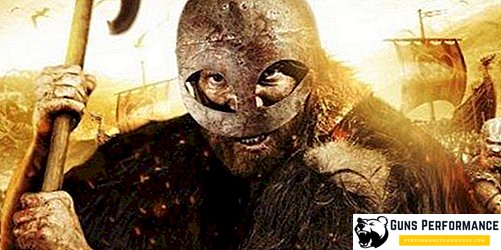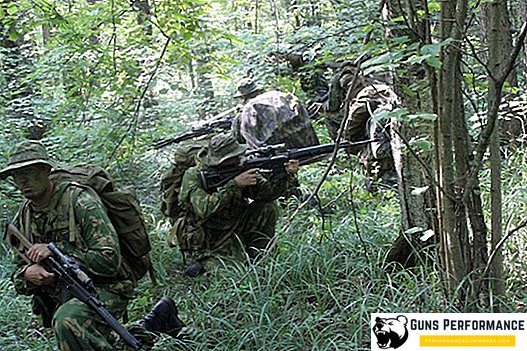
The Vikings are the common name of sea robbers, who for several centuries have plundered Europe. Interestingly, the Vikings themselves called themselves Norega, Dan, but not the Vikings. Since the campaign for prey was called "go to the Vic", then the warriors were called the Vikings.
The first acquaintance of Europeans with the northern warriors
In the summer of 789, the first historical meeting of the inhabitants of the kingdom of Wessex in the Vikings took place. The description of this meeting was recorded by local chroniclers. Three long drakkars landed on the English shores, from which blond and tall warriors came ashore, speaking in a vaguely familiar but incomprehensible language. The newcomers were met by the ruler of the local lands, whose name was preserved in the chronicles. This was Beohtrick with his retinue. There was a brief conversation with the aliens that ended with the Vikings snatching swords and axes and cutting out the entire squad. After that, laughing, they loaded the captured weapons and armor of the dead into their ships and set sail in an unknown direction.
Of course, given the harsh life of that era, there was nothing strange about this attack. Local residents constantly feuded among themselves or with neighboring nations. Why did the chroniclers capture this particular Viking battle? This was facilitated by several unusual facts:
- The Viking language was unfamiliar to the English soldiers, so they could not understand who these warriors were;
- The appearance of the Vikings and their mighty physique struck the British;
- Almost all of Europe by this time adopted Christianity, and unknown warriors prayed to their gods and shouted their names in battle.
This incident struck the British, although no one then could have thought that this was the beginning of the great Viking expansion, which (judging by the historical documents of that era) lasted for about three centuries.

Let's try to figure out who the Vikings are and where they came from.
Historical background that led to the appearance of the Vikings in Europe

People in the territory of Scandinavia appeared quite a long time ago, as early as the 6th millennium BC. Even then, the ancestors of all the ancient Germanic peoples began to inhabit the territories in which present-day Sweden and Denmark are located.
After the fall of Rome, when the great migration of nations began and all the barbarians began to accept Christianity, Scandinavia remained out of work, it was too far away. Stories about Christians even reached the Vikings, then in a highly distorted form. The gods of the Vikings differed in their harsh temper, so the rare missionaries who entered the territory of Scandinavia could only be surprised to see how the ancient German gods reigned supreme there. History has not preserved the names of those courageous preachers, but most likely they were simply captured into slavery.
It is still not clear to many why Scandinavians suddenly decided to engage in mass robbery. If you read the historical records of that era, the answer to this question suggests itself.
Approximately in the 5th century AD, a global cooling began, which significantly reduced the number of cultivated land, and in Scandinavia there were few of them. These anomalies have reduced the population of Scandinavia by about 40 percent. Scientists arrived at this conclusion after examining many farms and other settlements of the ancient Scandinavians of that era.
The terrible cold lasted about two centuries, after which the climate improved. History says that a sharp increase in living standards leads to a population explosion. The scanty nature of Scandinavia was not able to feed a sharply increased number of people, especially since there were very few suitable lands for this in Norway.
Since there was no point in crushing the already small plots of land (the earth would still not be able to feed everyone), the issue of food shortages became acute. It is believed that this is what prompted the best warriors to look for an opportunity to feed themselves in other ways.
Where did the ancient Scandinavians have such deep knowledge in shipping

The Viking village could not feed all of its inhabitants at the expense of agriculture. All Scandinavians were forced to become beautiful fishermen. The best fishermen were residents of Norway, they made a great contribution to the formation of Viking navigation.
Since the inhabitants of Scandinavia often quarreled with each other, they often had clashes at sea. It was precisely in such skirmishes that the sailors learned how to fight perfectly, because their rooks had already accommodated 20 rowers in the 4th century, each of whom was a skilled warrior.
Since it was not profitable to rob each other (and what can be obtained from the same poor Scandinavian, except for the loss of the squad), the Vikings drew attention to the neighbors who prospered on their rich lands.
Viking Village, the first trips to England
Viking campaigns began in their villages, where rich labels collected warriors for campaigns. There is no historical document that would reveal the name of the person who made the first trip to England, but one thing is clear - this trip was a reconnaissance trip. After the first successful campaign followed by others. The warriors who remained in the village, seeing what fabulous riches the brave men got, rushed into the next campaigns. One such campaign could bring such riches that the ordinary Scandinavian could not earn in a lifetime.
The English villages were full of defenseless peasants who, barely seeing the Viking ax, rushed to flee and did not even think to resist. The troops of the English nobility did not have time to help the peasants, especially since the Viking raids were lightning.
Why European states could not repel the pagans of the north
A reasonable question arises as to why European kings, having heard about the Vikings for the first time, could not really appreciate the scale of the threat. Even the Franks, who partially inherited military secrets and the development of the Romans, possessing sufficiently serious intelligence, could not stand against wild pagans.
Most likely, the Europeans simply initially reacted with disdain to the pagans, considering them to be a wild horde of barbarians who could easily be defeated by the troops of European states. The Vikings quickly proved that even the famous knightly cavalry of the Franks, who had trampled into the land of any enemy, could not stand against the wall of shields of the severe admirers of the god Odin. Europeans quickly imbued with respect for the combat skills of the Scandinavians, and when they mastered the languages of the Franks and Angles (at the level of negotiation), they preferred to pay tribute to the Vikings.
The meaning of the word "Viking" and the composition of the Scandinavian Hird

Scandinavian languages allow you to accurately translate the meaning of the word "viking". This word consists of two words:
- "Vick" - which means the bay or bay;
- "Ing" - which most often meant the tribal affiliation of a certain community of people.
Viking squads consisted of:
- Younger sons who were left without a plot of land;
- The poor Scandinavians, who originally had no land;
- Adventure seekers;
- Odin's warriors (who were all berserks and ulfkhednars).
In addition, as part of the hird (Viking squads) could be not only the Scandinavians. Any adventurer who knew how to fight could count on a place in the squad. After several joint battles, if the new team member did not die and showed himself to be a skillful warrior, he was solemnly accepted into the hird - a real brotherhood of soldiers.
Viking moral principles
Despite the fact that most of the Vikings were Scandinavians, they did not disdain to attack not only other peoples, but also each other. Viking sagas (often based on historical truth) are full of descriptions of such battles. Most often, Viking attacks on their countrymen were due to the following reasons:
- The return of the squad from a successful campaign could have been provoked by the attack of less successful fellow craftsmen. It is possible to recall more than one story, when several ships united and captured a retarded after a successful march;
- Inexperienced Vikings could attack the neighboring village, while the majority of combat-ready men swam off to the march. These actions helped to equip their squad and gave combat experience to newcomers;
- Often the cause of the attack could be blood feud.
Often, even with joint attacks, the hirds could get into trouble while dividing the loot, if it seemed to the leader of one of the squads that he had been deceived. It was better for a viking to die than to endure such an injustice.
Vikings - the first in the history of the Marines

It is the Vikings who can be considered the inventors of the tactics of the marines, who have survived to this day practically without any changes. The basis of a successful attack was a lightning attack and the same rapid retreat. Greedy and sluggish Vikings, robbing before the arrival of the royal troops, suffered heavy losses in clashes, gaining invaluable experience in the conduct of hostilities.
Although after the 10th century, the Vikings became famous as pioneers of new lands, traders and mercenaries at the court of the Byzantine emperor, until the 10th century, they were engaged exclusively in looting, from which all inhabitants of the European coast trembled in fear. Since the drakkars walked along rivers perfectly, the Vikings easily penetrated into the interior of the country, plundering the local population.
Viking Names
The names of the Vikings to modern man may seem ridiculous. On the Scandinavian names written many scientific papers. In addition to the names that were given at birth, every Viking had a nickname. The nickname was given on the basis of any personal qualities of a warrior (for example, One-eyed or Red), or in honor of any event in the life of this warrior (for example, Leaky Back or Strangler). It is also interesting that some ridiculous nicknames and kings could wear some funny nicknames, because it was given for life.
The names themselves most often denoted any animal or contained a part of the name of God. Viking legend Rognar (Warrior of the Gods) bore the nickname "Hairy Pants" for always walking in fur pants with fur outside.
Viking kings and their gods
The king of the Vikings was king. In his absence, the function of a king could be performed by any notable Jarl. It is noteworthy that the Viking king did not have any unlimited power and could be summoned to a fight by any free Scandinavian (although it wasn’t necessary for him to fight himself, he could expose a professional duel instead of himself). The final of the duel was considered the will of the gods, and the victorious warlord himself became his place.
The supreme Viking god was One. Although every Scandinavian understood the gods of his pantheon thoroughly, the Vikings revered Odin and Thor most of all.
Viking weapons

Initially, the main weapon of the Vikings was an ax, as it was the cheapest of all. Experienced warriors in battles acquired swords, although they did not let the ax out of their hands. A standard set of weapons experienced Viking looked like this:
- A spear that was the constant companion of a battle ax;
- Viking sword - was a standard caroling, although there were options with one-sided sharpening. The sword was owned only by experienced warriors who were able to take it in battle, or wealthy Vikings who were able to buy such weapons for their own money from blacksmiths or more successful friends on Hird;
- Viking ax. It is about the ax that the legends go about as the main weapon of the Vikings. The axes were both single-handed, paired with a shield, and heavy "bearded" two-handed axes.

How did the Icelanders appear
After the king of Norway began to baptize all his subjects, many pagans had to flee to new lands. Opening in 861, Iceland had the most opportune. Between 872 and 930, up to 30,000 Norwegians moved to Iceland. This island was able to preserve the traditional faith of the Vikings to this day.
Vikings were the best warriors of their time. Many rulers of distant lands hired Vikings to defend their lands from enemies. Although the mercenary army of elite fighters was expensive, they defended their employers well.












